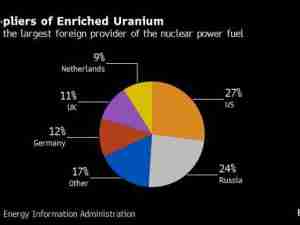The U.S. House of Representatives voted overwhelmingly to end regular trade relations with Russia in a move that would allow the U.S. to sharply raise tariffs on Russian goods entering the country.
The bill, passed 424-8, would end what’s known as “permanent normal trade relations” for Russia, putting it in a category with pariah states North Korea and Cuba. The legislation, supported by President Joe Biden, would allow the U.S. to hit Russia with significantly higher tariffs than those it applies to other World Trade Organization members. The WTO has a core principle of treating all members equally.
Next step is for the Senate to consider the legislation, and Majority Leader Chuck Schumer said Thursday morning that body will quickly pass the bill, sending it to Biden to sign. The bill passed the House via a fast-track procedure used for measures that have broad support. Schumer highlighted that both parties are united in sending a clear message to Russian President Vladimir Putin.
The bill also applies Belarus, which has hosted the Russian troops invading Ukraine.
“This very important legislation will send a message to Putin,” Ukraine-born Representative Victoria Spartz, an Indiana Republican, said before the House vote.
Eight Republicans voted against the bill: Representatives Glenn Grothman of Wisconsin; Thomas Massie of Kentucky; Matt Gaetz of Florida; Lauren Boebert of Colorado; Andy Biggs of Arizona; Marjorie Taylor Greene of Georgia; Chip Roy of Texas; Dan Bishop of North Carolina.
Ending the normal trading relationship with Russia is the latest in a series of actions from Congress to intensify pressure on Russia’s economy after Putin invaded Ukraine last month. The House last week voted to ban imports of Russian oil, though it’s unclear if that will be considered in the Senate—where some lawmakers say Biden’s executive order taking the same action makes the move unnecessary.
The trade bill also includes an expansion of the the Global Magnitsky Human Rights Accountability Act. That would allow the Biden administration to impose further sanctions on Russian officials for human-rights violations.
The House also included the Magnitsky language in the legislation to ban Russian oil imports. Including it in this bill means that the measure can still advance even if the oil ban bill dies in the Senate.
About 5% of Russian exports went to the U.S. in 2020, according to International Monetary Fund data compiled by Bloomberg.
By mid-March 2022 a quarter of the WTO’s 164 members—collectively representing 58% of the global gross domestic product—were poised to stop treating Russia as a most-favored-nation under WTO rules. Besides the U.S., the list includes the European Union’s 27 members, Japan, the U.K., Canada, South Korea and Australia.







